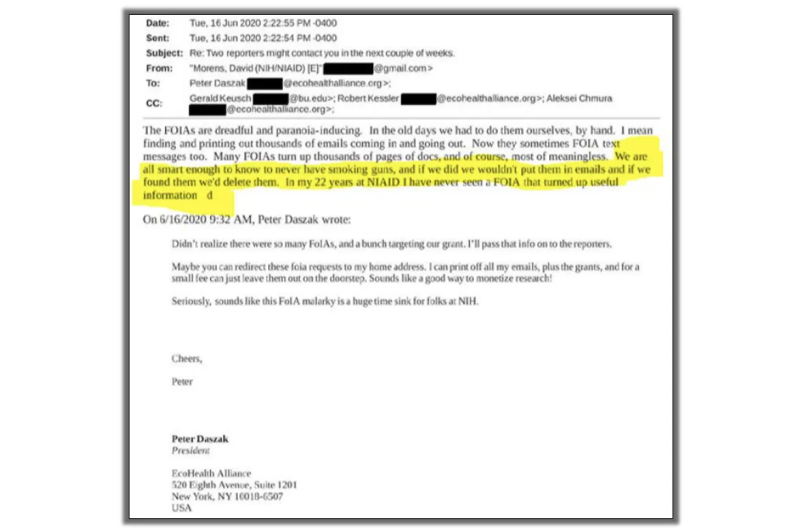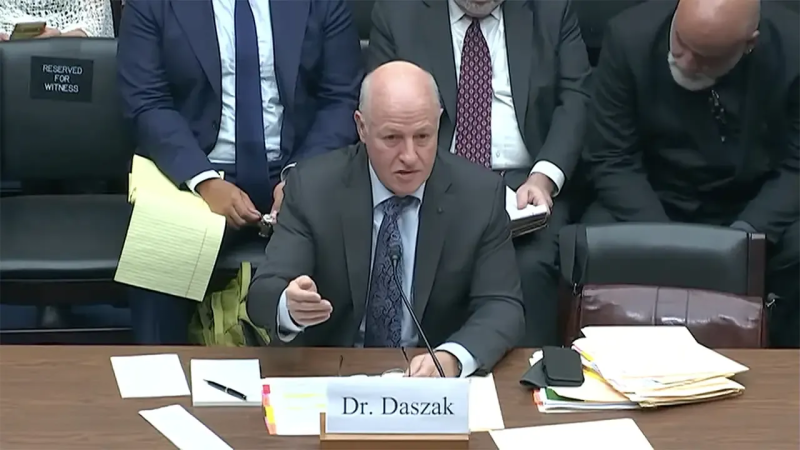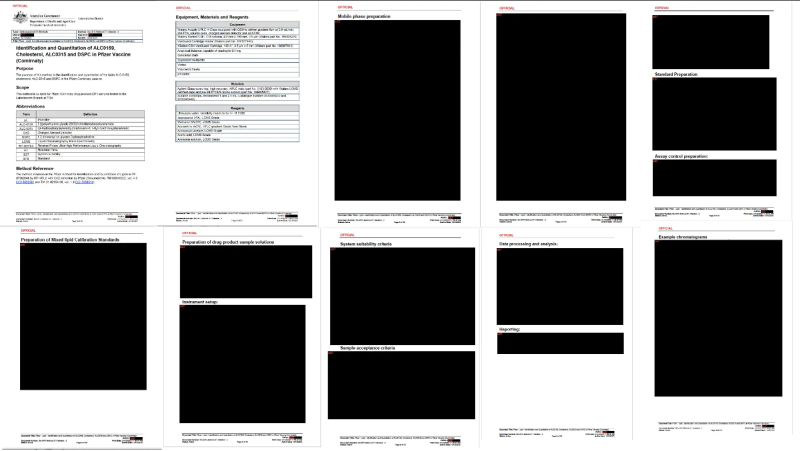The Great FOIA Dodge
Freedom of Information Act (FOIA) requests are meant to promote government transparency and accountability and give the public access to information about the operations and decisions of federal agencies.
But serious concerns have been raised about the ascertainment of public records and the lack of transparency of federal agencies.
In recent congressional hearings, it was revealed that top US public health officials created ‘secret’ back channels for communications on federal business in order to avoid prying eyes.
David Morens, a former top advisor to Anthony Fauci, allegedly destroyed public documents and boasted to colleagues that he would communicate with Fauci on personal Gmail accounts to circumvent FOIA requests.

“I can either send stuff to Tony [Fauci] on his private Gmail, or hand it to him,” wrote Morens in emails presented by the House Select Subcommittee.
“[Fauci] is too smart to let colleagues send him stuff that could cause trouble,” added Morens, suggesting that Fauci himself was involved in dodging FOIAs.

In the subpoenaed emails, Morens wrote that someone in the FOIA office of the National Institutes of Health (NIH) gave him instructions on how to destroy public records, boasting that he could make emails vanish without a trace.
Activist Post is Google-Free — We Need Your Support
Contribute Just $1 Per Month at Patreon or SubscribeStar
“I learned from our foia lady here how to make emails disappear,” wrote Morens in one email.

Morens also wrote that he would delete emails that could present as “smoking guns” to avoid implicating his long-time friend Peter Daszak of EcoHealth Alliance, in the Covid-19 pandemic.

When Morens was questioned by the Subcommittee and asked why he was trying to hide his emails and destroy federal records, he stumbled and fumbled, he acted confused, and claimed he had little recollection of the emails.
He also claimed he had no understanding of what a federal record was, despite being a federal employee for over two decades.
“I truly don’t think I have ever seen a federal record in 26 years of being at NIH,” Morens told the committee.
Many are now wondering whether there will be accountability.
The US Department of Health and Human Services has already suspended funding to EcoHealth Alliance, which has been linked to gain-of-function research in Wuhan, and commenced formal debarment proceedings against Daszak.

“EcoHealth Alliance President Dr. Peter Daszak’s personal debarment will ensure he never again receives a single cent from U.S. taxpayers nor has the opportunity to start a new, untrustworthy organization,” Committee Chair Brad Wenstrup, said in a statement.
Morens however, is officially still an employee of the NIH, although he has been placed on administrative leave.
Senator Rand Paul of the US Homeland Security and Governmental Affairs Committee has written to the Department of Justice urging it to open an investigation into the alleged improper concealment and intentional destruction of records by Morens, stating;
Under 18 U.S.C. §2071, an individual who “willfully and unlawfully” conceals, removes or destroys a federal record can be fined and imprisoned for up to three years. The statute also applies to attempts to conceal, remove, or destroy a federal record.
Public health agencies have forgotten they work for the public. The deliberate obfuscation and lengthy delays in processing FOIA requests make it difficult to uncover important stories and hold these agencies to account.
I submitted a FOIA request to the US drug regulator – the FDA – which has been sitting idle for almost two years now. And when I enquired about its progress, the FDA said it was still in ‘triage.’
Hardly unsurprising, given the FDA wanted 75 years to release the data related to Pfizer’s pivotal Covid-19 mRNA trial. If it weren’t for the relentless efforts of Aaron Siri of Siri & Glimstad, these documents would still be buried in the FDA’s basement.
Delays are not the only way agencies can obfuscate information. Epoch Times journalist Zachary Stieber sent a FOIA request to the US CDC which resulted in 148 pages of communications, that were entirely redacted.

Similarly, I recently received documents from a FOIA request submitted to the Australian drug regulator – the TGA – seeking data on RNA stability testing carried out on specific batches of mRNA vaccines.
After months of delays, I finally received multiple documents which had all of the test results redacted. Below is an example of one document containing 10 pages;

According to the TGA, the results contained information “of a commercial value to Pfizer, the value of which would be diminished or destroyed if released.”
Never mind that the results of this testing are of value to the public, the TGA’s primary concern is protecting the interests of Pfizer.
And, despite being unable to decipher anything meaningful from the redacted documents, I was still charged $287 for the TGA’s time to deal with my request.
None of this bodes well for establishing trust in public health agencies, and I suspect this is just the tip of the iceberg.
Republished from the author’s Substack
Sourced from Brownstone Institute
Maryanne Demasi, 2023 Brownstone Fellow, is an investigative medical reporter with a PhD in rheumatology, who writes for online media and top-tiered medical journals. For over a decade, she produced TV documentaries for the Australian Broadcasting Corporation (ABC) and has worked as a speechwriter and political advisor for the South Australian Science Minister.
Become a Patron!
Or support us at SubscribeStar
Donate cryptocurrency HERE
Subscribe to Activist Post for truth, peace, and freedom news. Follow us on SoMee, Telegram, HIVE, Minds, MeWe, Twitter – X, Gab, and What Really Happened.
Provide, Protect and Profit from what’s coming! Get a free issue of Counter Markets today.



